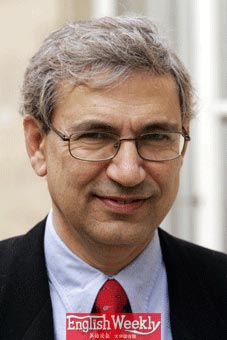| Orhan Pamuk获得2006年诺贝尔文学奖 |
| http://www.sina.com.cn 2006/12/01 16:43 英语周报大学版 |
 Orhan Pamuk获得2006年度诺贝尔文学奖 By Sarah Edmonds and Niklas Pollard STOCKHOLM (Reuters) — Turkey’s best-known novelist Orhan Pamuk, who faced trial this year for insulting his country, won the 2006 Nobel Prize for Literature on Thursday in a decision some critics called politically charged. “I am very glad and honoured. I am very pleased,” the Turkish writer told Sweden’s Svenska Dagbladet newspaper when asked how he felt about winning the 10 million Swedish crown ($1.36 million) prize. “I will try to recover from this shock.” The Swedish Academy declared Pamuk the winner on a day when, to Turkey’s fury, the French lower house of parliament approved a bill making it a crime to deny the Armenian genocide. In a what was seen as a test case for freedom of speech in Turkey, Pamuk was tried for insulting “Turkishness” after telling a Swiss paper last year that 1 million Armenians had died in Turkey during World War One and 30,000 Kurds had perished in recent decades. Though the court dismissed the charges on a technicality, other writers and journalists are still being prosecuted under the article and can face a jail sentence of up to three years. EU Enlargement Commissioner Olli Rehn celebrated Pamuk’s award as a triumph for free speech. “Today’s Nobel Prize is good news for world literature, but also good news for artistic freedom and for freedom of expression,” he said in a statement. Pamuk’s best-known novels include “My Name is Red” and “Snow,” works that focus on the clash between past and present, East and West, secularism and Islamism — problems at the heart of Turkey’s struggle to develop. Academy head Horace Engdahl stressed on Thursday that politics did not color the selection process. “I believe that this [choice] will be met with delight by all readers,” Engdahl told reporters. “But it can naturally give rise to a certain amount of political turbulence. That is not what we are interested in.” Still, picks such as Pamuk and 2005 winner Harold Pinter, a vocal U.S. critic, have led some to question this. “I think you can say there is more than literature at stake6 here ... Perhaps it’s always been a mixture between what’s on the printed page and what the writer stands for politically,” Ian Jack, editor of literary periodical Granta, told Reuters. There is no question, critics said, that Pamuk’s writing is worthy of admiration. His work has been translated into many languages and attracted international fans. “In the quest for the melancholic soul of his native city, [Pamuk] has discovered new symbols for the clash and interlacing of cultures,” the Swedish Academy said in its citation. (2006-2007学年第11期) |
| 【发表评论】 |
|
|
| 【评论】【论坛】【收藏此页】【大 中 小】【多种方式看新闻】【下载点点通】【打印】【关闭】 |